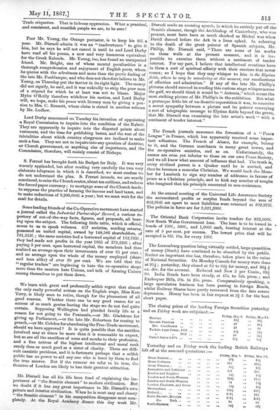Mr. Disraeli has all his life been fond of explaining
the im- portance of "the Semitic element" to modern civilization. But we doubt if it has any great importance to Mr. Disraeli's own private and interior civilization. When he is most easy and cheery "the Semitic element" in his composition disappears most com- pletely. At the Royal Academy dinner this day week Mr.
Disraeli made an amusing speech, in which he entirely put off the Semitic element, though the Archbishop of Canterbury, who was present, must have been as much shocked as Michal was when David danced before the Ark in a linen ephod. In referring to the death of the great painter of Spanish subjects, Mr. Phillip, Mr. Disraeli said, "There are some of his works on these walls at the present moment, and it is im- possible to examine them without a sentiment of tender interest. For my part, I believe that intellectual creations have in them a sort of spiritual affinity with their creators that never ceases; so I hope that they may whisper to him in the Elysian fields, where he may be wandering at this moment, our recollections of affection and admiration." If any of the late Mr. Phillip's pictures should succeed in sending this curious stage whisper across the gulf, we should think it would be "Antonia," which seems the most striking picture of Mr. Philip's in the exhibition. But what a grotesque little bit of un-Semitic superstition it was, to conceive a secret sympathy between a picture and its painter conveying a sort of telegraphic message to Elysian fields beyond the grave, that Mr. Disraeli was examining the late artist's work" with a sentiment of tender interest."






























 Previous page
Previous page